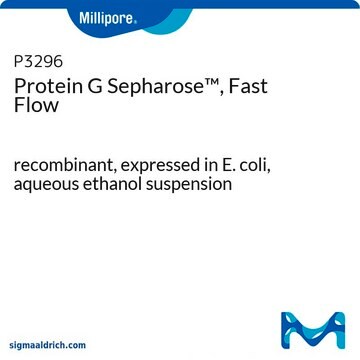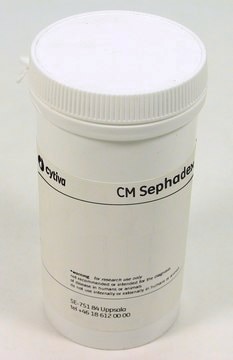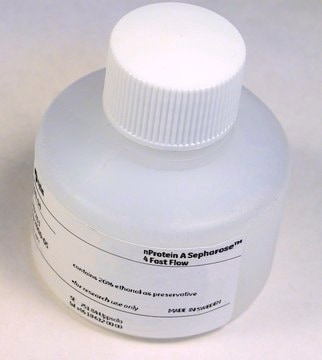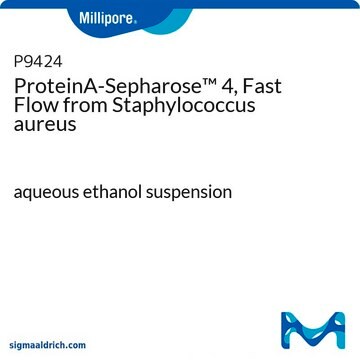GE17-0618-05
Protein G Sepharose™ 4 Fast Flow
Cytiva 17-0618-05, pack of 200 mL
Synonyma:
Fast Flow resin, Antibody purification resin, IgG purification resin
About This Item
Doporučené produkty
ligand
recombinant protein G lacking albumin-binding region
packaging
pack of 200 mL
manufacturer/tradename
Cytiva 17-0618-05
storage condition
(20% Ehtanol)
matrix
4% cross-linked agarose
average diameter
90 μm (d50v)
cleaning in place
2-10
working range
3-9
suitability
suitable for bioprocess medium
storage temp.
2-8°C
General description
Protein G Sepharose™ 4 Fast Flow has recombinant protein G immobilized by the cyanogen bromide (CNBr) method to Sepharose™ 4 Fast Flow. Protein G exhibit binding specificities that complement Protein A media and binds to the Fc region of IgG from a variety of mammalian species. Protein G Sepharose™ 4 Fast Flow may be used to isolate and purify classes, subclasses and fragments of immunoglobulins from any biological fluid or cell culture medium.
As member of the BioProcess media range, Protein G Sepharose™ 4 Fast Flow meets industrial demands with security of supply and comprehensive technical and regulatory support.
Features and Benefits
- Binding specificities that complement Protein A media.
- Binds a broad range of IgG species and subclasses.
- Multi-point attachment minimizes ligand leakage.
- Used in a range of research applications.
Storage and Stability
Analysis Note
Legal Information
signalword
Warning
hcodes
Storage Class
3 - Flammable liquids
Vyberte jednu z posledních verzí:
Osvědčení o analýze (COA)
It looks like we've run into a problem, but you can still download Certificates of Analysis from our Dokumenty section.
Potřebujete-li pomoc, obraťte se na Zákaznická podpora
Již tento produkt vlastníte?
Dokumenty související s produkty, které jste v minulosti zakoupili, byly za účelem usnadnění shromážděny ve vaší Knihovně dokumentů.
Zákazníci si také prohlíželi
Sortimentní položky
Purify monoclonal or polyclonal IgG from serum, cell culture supernatant or ascitic fluid using the HiTrap Protein G HP from Cytiva, an affinity-exclusion chromatography product containing Sepharose-immobilized Protein G.
This page describes immunoprecipitation (immunoaffinity or pull-down techniques).
This page describes efficient column packing and preparation for affinity chromatography of antibodies.
Tato stránka ukazuje, jak převést průtokovou rychlost na objemový průtok při afinitní chromatografii protilátek.
Protokoly
This page provides information about different pull-down assays for the further isolation of multiprotein complexes to identify their components with products from Cytiva.
Tato stránka poskytuje informace o různých pull-down testech pro další izolaci multiproteinových komplexů za účelem identifikace jejich složek pomocí produktů společnosti Cytiva.
This page shows how to separate IgG antibodies by affinity chromatography using Protein G Sepharose 4 Fast Flow from Cytiva.
Náš tým vědeckých pracovníků má zkušenosti ve všech oblastech výzkumu, včetně přírodních věd, materiálových věd, chemické syntézy, chromatografie, analytiky a mnoha dalších..
Obraťte se na technický servis.











